Earlier in the day, when the president's plane landed, he was peppered along the receiving line by officials who urged him to condemn the Coast Guard incident. Protesters lined his route. And Jorge Mas Santos ponied up $25,000 so he could attend the fundraiser and bend the president's ear.
During the event, Clinton responded to questions about the rafter incident by deviating from the "talking points" his assistants had prepared. Instead he emoted. He labeled the Coast Guard's actions "outrageous" and appeared to signal a possible shift in policy regarding the 1995 immigration accord between the United States and Cuba, which mandates repatriation for any rafter picked up in the water. "We have to look and see whether or not the policy we have is manageable, given the problems that we're facing," Clinton said.
After dinner Mas Santos walked across the street from Fanjul's home to a bank of TV cameras and declared that, following his private meeting with Clinton, the president had pledged to review the immigration policy.
Administration officials, however, say there was no private meeting. Mas Santos merely spoke to the president for a few moments in the receiving line, they report, clearly eager to dispel the notion that the younger Mas generation will have the same sway over U.S. policy as the last. White House officials, in fact, scrambled to make sure the only tête-à-tête the president had regarding the rafter incident was with Miami-Dade Mayor Alex Penelas. But there was a problem: When Clinton arrived in Miami, Penelas was in New York meeting with NAACP officials regarding the county's bid to host their national convention in 2003.
Penelas's schedule had always called for him to return to Miami in time to bid farewell to the president, but now there was added pressure for the mayor to make it home in time. He did. Penelas and the president spent nearly twelve minutes talking on the tarmac alongside Air Force One. Television cameras captured the moment, which was precisely the point.
Penelas asked for the Coast Guard to be given more resources to stem the flow of refugees and to make a concerted effort to halt smuggling. He did not, however, ask for an end to the immigration accord with Cuba.
The next day at the daily State Department news briefing, spokesman Jamie Rubin was asked about the president's statement at Fanjul's home. "The president last night made some comments about reviewing the Cuban migration policy," a reporter began. "I was wondering if you could elaborate a little on how you were looking into changing that?"
"Yes, I think that's probably more than the president said," Rubin responded, "but let me give you our view. Our commitment to the accords reached with Cuba in 1994 and 1995 remain unchanged. We must enforce our laws and protect our borders while directing migration into safe, legal, and orderly channels to discourage irregular departures. We have programs that provide visas to at least 20,000 Cubans per year. That remains our policy and the president did not indicate a desire to change that."
Once Clinton got out of Miami, the spell cast over him was broken and his pain subsided.










